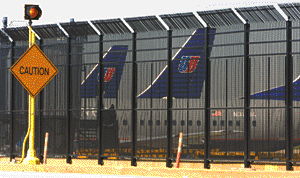Travel Restricted
The attacks on the World Trade Center and Pentagon will mean heightened security, new corporate policies and changes for all business travelers, say industry executives and consultants.

\
Airports across the country shut down operations after last week's terrorist attacks. Experts predict business travel will drop sharply.
{C}
Compaq Computer issued a worldwide travel advisory with a "heightened approach to employee security and business travel," according to the company. Compaq suspended all nonessential business travel and required that corporate security be contacted in advance for cases involving international "high-risk" locations.
Compaq also recommended that employees avoid visiting large public landmarks and U.S. interests both in the United States and abroad. Furthermore, the company advised employees not to wear corporate logos on clothing, bags or accessories and not to use business cards as luggage tags.
For some companies, though, travel is the backbone of their business.
"We're in the consulting business and it's built around the travel model," said Martin Dunsby, a global leader of Deloitte Consulting's New York Wireless Initiative who was en route from New York to San Diego when the World Trade Center was struck. "This is probably going to make us even more conscious of issues around travel and be more cautious," he said. "You might see more remote development." The plane Dunsby was on during the attack was rerouted to Dallas.
Corporations also may change their policies to limit the number of senior executives and employees traveling on any given plane. "We try to limit those that go to any one place," said Anthony Daley, general manager of Westcon, a Nortel Networks-focused subsidiary of Westcon Group, Tarrytown, N.Y. "I don't think we have any policies in place that state that," Daley said. "I think that after something like this, you re-evaluate everything. We reiterate security access to know who should be in the building, and we are trying to limit travel until the situation gets under control."
Distribution giant Ingram Micro doesn't have a formal policy in place but attempts to limit the number of executives it has flying on a single plane.
The Federal Aviation Administration has already implemented new policies, including increased inspections with metal detector wands of all passengers; random screening of luggage and carry-on bags; an end to curbside check-in for baggage; and the elimination of flight check-ins from the Internet and hotels.
"Everybody is going to have to take a hard look at what kind of protection they have and what can they do to beef it up," said Patrick DeChirico, a consultant on terrorism/counterterrorism and disaster recovery at BWT Associates, Shrewsbury, Mass. "There isn't going to be a company or airport around the country that isn't going to beef up their security. That's the way it is going to be."
DeChirico cautioned that overreacting because of "adrenaline flowing and everyone hyped" from the disaster could be dangerous. "You have to be logical about what is going on, understand what the situation is and what you can do to put security in place to protect your people and company," he said. "People come first.
There isn't a CEO who wouldn't say that."
Ron Young, chief marketing officer at Yipes, a metropolitan-area network service provider based in San Francisco, said he doesn't anticipate changing how he travels and does business. "We are consistently travelling to keep our 24 markets up and running," said Young, whose company is offering six months of free Internet access to anyone in New York whose office was destroyed by the attack.
"I think such issues should not impact the way we conduct our business and our lives," Young said. "I don't think you'll see a change from us at all. We need to keep doing what we do, or the terrorists have won."
SCOTT CAMPBELL contributed to this story.